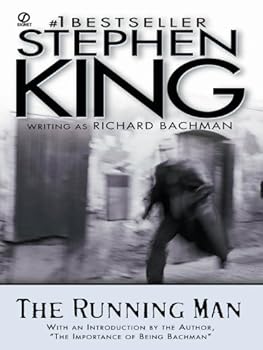
![]() The Running Man by Stephen King
The Running Man by Stephen King
Ben Richards hates America’s dystopian future. Because he quit his job cleaning up atomic waste before it could sterilize him, Ben finds himself blacklisted and unemployable. He and his wife, Sheila, did manage to conceive, but their daughter now suffers from pneumonia in polluted Co-Op City. Sheila makes ends meet by turning tricks, which bothers Ben.
Ben looks at the people around him and is sickened by their devotion to the Network, a corporation that organizes and televises gladiator games for the masses. Ben knows the games are rigged — no one ever wins — but, his back against the wall, he decides to apply for the most dangerous game: “The Running Man.” If he’s smart and lucky, he will make enough before his inevitable death that Sheila will be able to afford medical care for their daughter.
“The Running Man” is the Network’s most deadly show, but it is also its most popular show. In it, Evan McCone and his Hunters pursue a man on the run, and viewers are invited to call in to the Network if they spot McCone’s prey. The contestant, meanwhile, must survive and must also mail video footage of himself to the Network every day. The running man earns money so long as he lives, and in theory, he could win it all — andlive — after thirty days. Sadly, few contestants last more than a day or two.
Originally published under his pseudonym, Richard Bachman, The Running Man is one of Stephen King’s bitterest novels. King has given several reasons why writing under Bachman’s name appealed to him. However, perhaps the most persuasive reason for him to write The Running Man under Bachman’s name rather than his own is that it allowed him to write in a different, often darker, style. It certainly shows here. Although The Running Man is sometimes thrilling to read, it is mostly corrosive. None of the characters is sympathetic, including Ben Richards. He has every reason to be angry about the future — it is sadistic and corrupted — but the things that might make him sympathetic (as opposed to our rooting for him by default) only appear briefly. Sheila has a handful of lines and his daughter is more abstraction than character. Ben finds some allies, but they are just as pathetic. We spend the entire novel in Ben’s head, and it’s about as ugly as the Network’s ethics.
But The Running Man does have pace, and it does feel more “Bachman” than “King.” Bachman writes anger without filtering it through the psyche of an emotionally vulnerable (but supernaturally powerful) protagonist. Readers that are curious about King’s body of work or who wonder what The Hunger Games was like thirty years ago should consider The Running Man.
Just don’t read the introduction, which gives away the novel’s ending. I did watch the film adaptation, and it’s all but unrecognizable.



There were two Bachman books that I didn’t read and this was one of them. Thanks for the review, Ryan. The darkness and dystopian nature of many of the Bachman books remind me of THE GUNSLINGER.
They both a less than ideal world. Somehow, however, I find Midworld both depressing and cool — maybe romantically tragic? — whereas there’s nothing cool about Coop City. It just sucks to be there.
I just read this last summer, and LOVED it. I don’t know why it felt so impressive–I might have been going through a time of particular socio-political dissatisfaction–but I finished it in two days and wrote long emails to friends about it.
It might also have been that Stephen King thing–the thing he presumably sold his soul and firstborn child to get–which makes every damn thing he writes a page turner. ON WRITING was a page turner, for the love of god.
I loved ON WRITING.